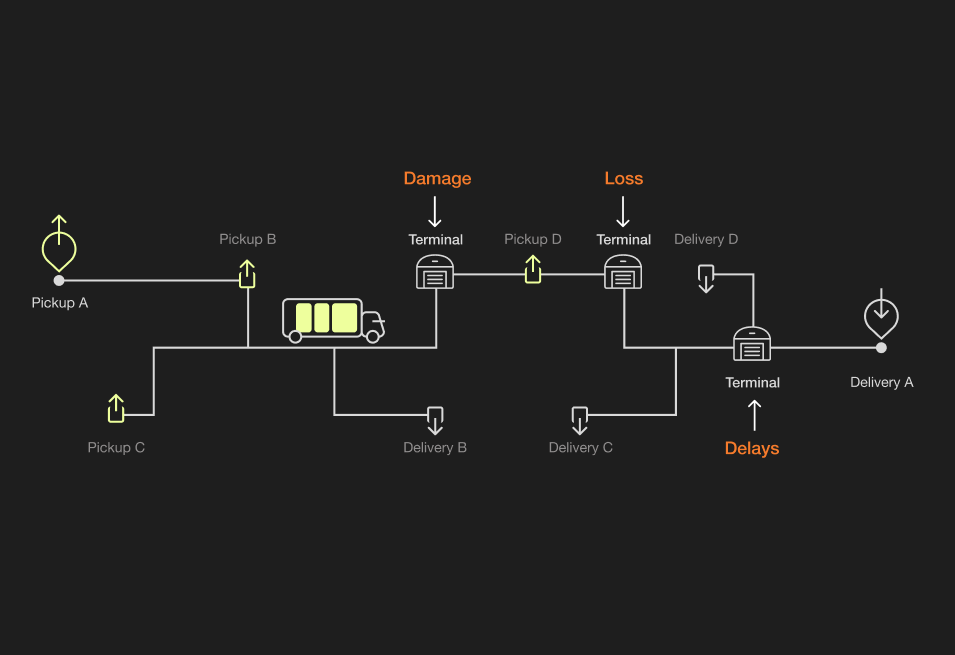Inbound Logistics: Definition and Guide

What are inbound logistics?
In the world of supply chain management, inbound logistics plays a vital role in ensuring the smooth flow of goods from suppliers to businesses. But what exactly does inbound logistics entail? Inbound logistics refers to the set of activities and processes involved in managing the transportation, storage, and handling of goods as they enter a business's premises — in other words, it's the opposite of outbound logistics.
Importance of inbound logistics for businesses
Efficient inbound logistics is crucial for businesses for several reasons. First, it ensures a timely and reliable supply of raw materials and goods, enabling uninterrupted production and delivery to customers. Additionally, effective inbound logistics helps optimize inventory management, reduce costs, improve customer satisfaction, and enhance overall supply chain performance.
Inbound logistics process
The inbound logistics process encompasses various stages and activities businesses must undertake to receive and handle incoming goods.
- Businesses communicate their requirements to suppliers, placing orders for the necessary goods.
- They coordinate with suppliers to arrange transportation, including selecting carriers, determining shipping schedules, and negotiating terms.
- Businesses utilize tracking systems and tools to monitor the status and location of shipments, ensuring visibility throughout the transportation journey.
- Upon arrival, goods are unloaded from the transportation vehicles and properly handled to prevent damage or loss.
- Quality checks and inspections are performed to ensure that the received goods meet the specified standards and requirements.
- Businesses manage the storage and warehousing of incoming goods, including inventory management, organization, and space allocation.
To optimize the inbound logistics process, businesses need to carefully consider their network design. By strategically planning the arrangement of suppliers, warehouses, and transportation routes, businesses can streamline the flow of incoming goods. A well-designed network allows for efficient coordination between suppliers and ensures timely deliveries, reducing lead times and increasing customer satisfaction. In the next section, we will explore the key factors and considerations involved in designing an effective network for inbound logistics.
Network design for inbound logistics
Designing an efficient inbound logistics network requires strategic decision-making and meticulous planning. Important factors to consider include the identification of dependable suppliers and vendors capable of consistently delivering high-quality goods punctually. Additionally, evaluating various transportation modes based on cost, speed, and reliability is crucial. Analyzing multiple factors helps determine the most efficient shipping routes, while effective inventory management minimizes holding costs and prevents stockouts. Lastly, fostering strong partnerships with suppliers enhances the overall inbound logistics process.
Challenges and solutions for inbound logistics
Managing inbound logistics comes with its fair share of challenges that businesses need to overcome for efficient operations. These challenges include:
- Capacity constraints and demand variability: Fluctuating customer demands and limited transportation and storage resources can lead to inefficiencies and delays.
- Transportation delays and disruptions: Factors such as traffic congestion, adverse weather conditions, or labor strikes can significantly impact inbound logistics.
- Quality control and compliance issues: Ensuring product quality and regulatory compliance is crucial in inbound logistics.
- Lack of real-time visibility: Limited visibility into inbound shipments can hinder effective planning and response to potential issues.
To address these challenges, businesses can implement relevant solutions, such as:
- Freight Management Systems: Implementing a robust freight management system can help businesses streamline their inbound logistics processes. These systems provide end-to-end visibility, automate transportation planning, optimize route selection, and consolidate shipments to maximize capacity utilization.
- Collaborative planning and coordination: Establishing strong partnerships and communication channels with suppliers allows businesses to gain insight into production schedules and potential capacity constraints. This collaboration enables better planning and coordination of inbound shipments, reducing delays and improving efficiency.
- Proactive risk management: Developing contingency plans and diversifying transportation options help mitigate the impact of transportation delays and disruptions. By having backup suppliers and alternative transportation routes in place, businesses can adapt to unexpected situations and minimize disruptions to their inbound logistics.
- Quality assurance programs: Implementing rigorous supplier evaluation processes and setting up robust quality control measures help ensure incoming goods meet the required standards. Regular inspections, testing, and certification processes contribute to maintaining product quality and compliance with regulations.
- Technology adoption: Utilizing advanced technologies, such as freight management systems, GPS tracking, and supply chain visibility tools, provides real-time visibility into inbound shipments. These technologies enable accurate tracking, monitoring, and control of goods, enhancing transparency, efficiency, and decision-making in inbound logistics.
By implementing these solutions, a logistics company like Flock Freight can help to optimize your inbound logistics processes, improve customer satisfaction, and drive overall supply chain efficiency. Effective management of capacity, transportation, quality control, and real-time visibility allows Flock Freight to navigate the challenges associated with inbound logistics and stay competitive in the marketplace. Additionally, streamlining inbound logistics with Flock Freight minimizes delays and reduces costs related to the transportation and storage of raw materials and components — enhancing the efficiency of your supply chain and enabling you to better meet customer demands.
Benefits of effective inbound logistics
Implementing effective inbound logistics practices can yield several benefits for businesses. These include:
- Reduced transportation costs: In 2022, we found that 45% of shippers moved partially empty truckloads, resulting in wasted resources and increased expenses. Additionally, 47% of truckloads had wasted space. By implementing efficient inbound logistics practices, businesses can optimize their transportation operations, minimize empty or wasted space in shipments, and ultimately reduce transportation costs.
- Improved inventory management: Inefficient inbound logistics can lead to inventory management challenges, such as stockouts or excess inventory. This can result in increased carrying costs, lost sales opportunities, or the need for expensive expedited shipping. By implementing effective inbound logistics practices, businesses can enhance their inventory management processes, ensuring optimal stock levels, minimizing stockouts, and reducing carrying costs.
- Enhanced supply chain visibility and transparency: In a deflationary market, shippers continue to face inefficiencies similar to those in an inflationary market. Maintaining visibility and transparency across the supply chain becomes crucial. By adopting advanced technologies and systems, such as real-time tracking and data analytics, businesses can gain better visibility into their inbound logistics operations. This allows for proactive decision-making, timely response to disruptions, and improved overall supply chain performance.
- Streamlined receiving and handling processes: Inefficient receiving and handling processes can lead to delays, errors, and damaged shipments. Shippers paid an average of $1,988 for each damaged and late less-than-truckload (LTL) shipment in 2022. Implementing effective inbound logistics practices involves streamlining receiving and handling processes through automation, standardized procedures, and employee training. This reduces errors, minimizes delays, and mitigates the risk of damaged shipments, leading to cost savings and improved customer satisfaction.
- Better supplier collaboration: With the increase in regulations, such as on-time in-full (OTIF) requirements, more shippers reported negative effects in 2022 compared to the previous year. Effective inbound logistics practices involve fostering strong relationships and collaboration with suppliers. By establishing clear communication channels, sharing data and forecasts, and aligning goals and expectations, businesses can improve supplier collaboration. This enables smoother operations, better coordination, and increased compliance with regulations, resulting in improved efficiency and customer satisfaction.
By incorporating these additional insights, the benefits of implementing effective inbound logistics practices become even more evident. Reduced transportation costs, improved inventory management, enhanced supply chain visibility, streamlined receiving and handling processes, and better supplier collaboration all contribute to operational efficiency, cost savings, and improved customer service for businesses.
Revolutionize your inbound logistics with Flock Freight
Don't let inefficient inbound logistics hinder your business's growth and profitability. Contact Flock Freight today to revolutionize your inbound logistics and experience the benefits of operational efficiency, reduced costs, and improved customer satisfaction.Join the Flock now, and take your inbound logistics to the next level.





